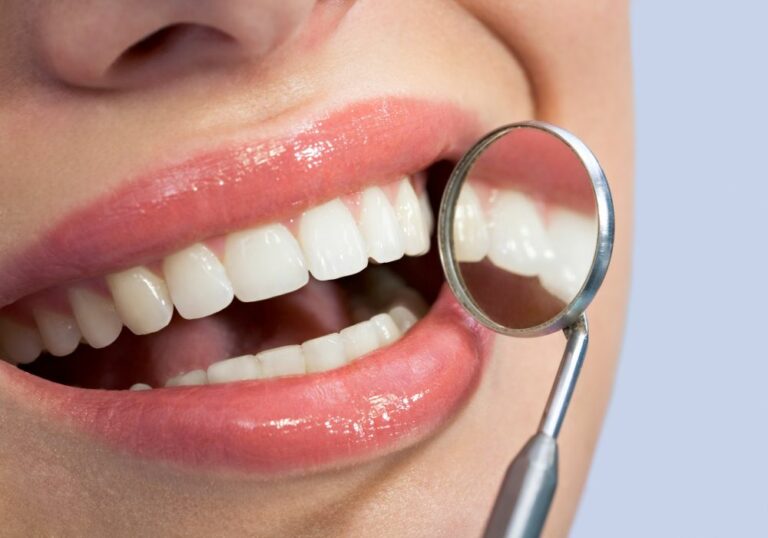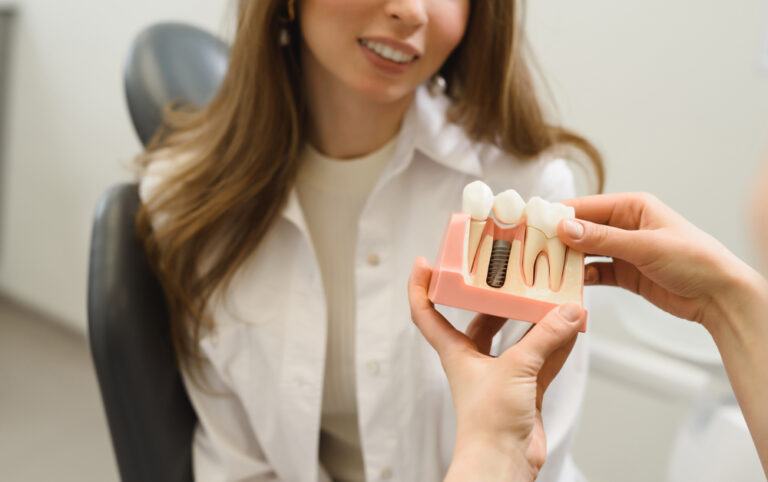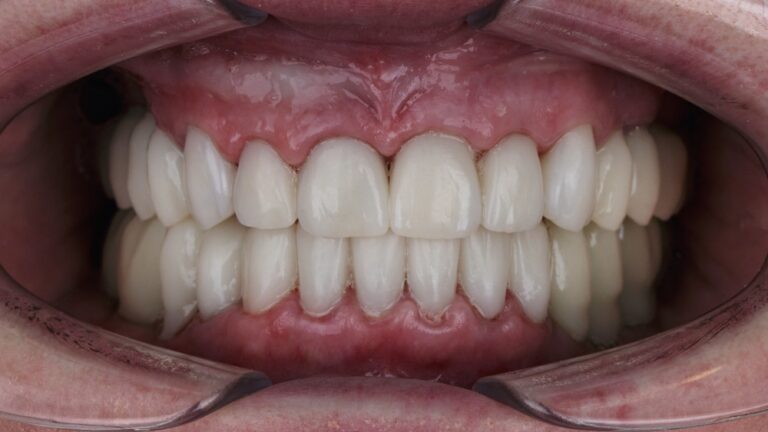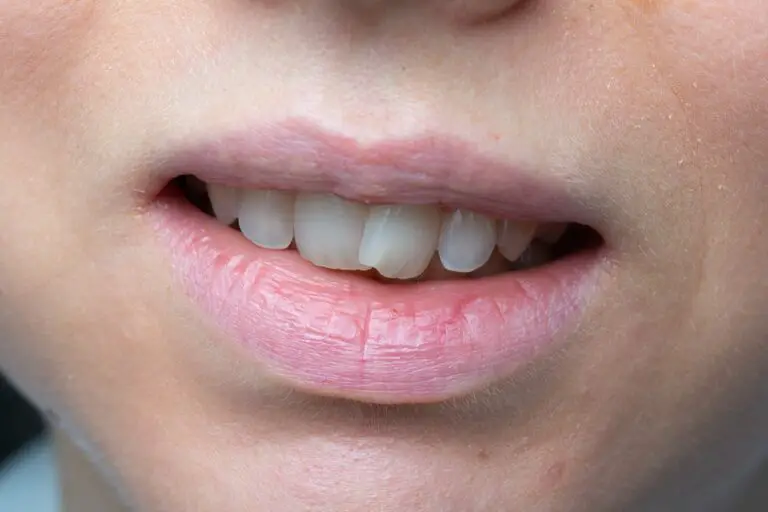Bad breath is a common problem that many people face. It can be embarrassing and affect one’s self-confidence. Brushing teeth is a common solution to this problem, but sometimes the bad breath persists even after brushing. In this article, we will explore the reasons why breath smells bad even after brushing teeth and what can be done to prevent it.
Understanding bad breath is important to know why it persists even after brushing teeth. Bad breath, also known as halitosis, is caused by bacteria in the mouth. These bacteria break down food particles and produce sulfur compounds that cause the unpleasant odor. Poor oral hygiene, certain foods, and medical conditions can contribute to bad breath.
Maintaining good oral hygiene is crucial in preventing bad breath. Brushing teeth twice a day, flossing, and using mouthwash can help remove food particles and bacteria in the mouth. A balanced diet and regular visits to the dentist can also help prevent bad breath. In the following sections, we will explore these topics in more detail and provide solutions to prevent bad breath.
Key Takeaways
- Bad breath is caused by bacteria in the mouth that produce sulfur compounds.
- Maintaining good oral hygiene, a balanced diet, and regular visits to the dentist can help prevent bad breath.
- Medical conditions and certain foods can also contribute to bad breath.
Understanding Bad Breath
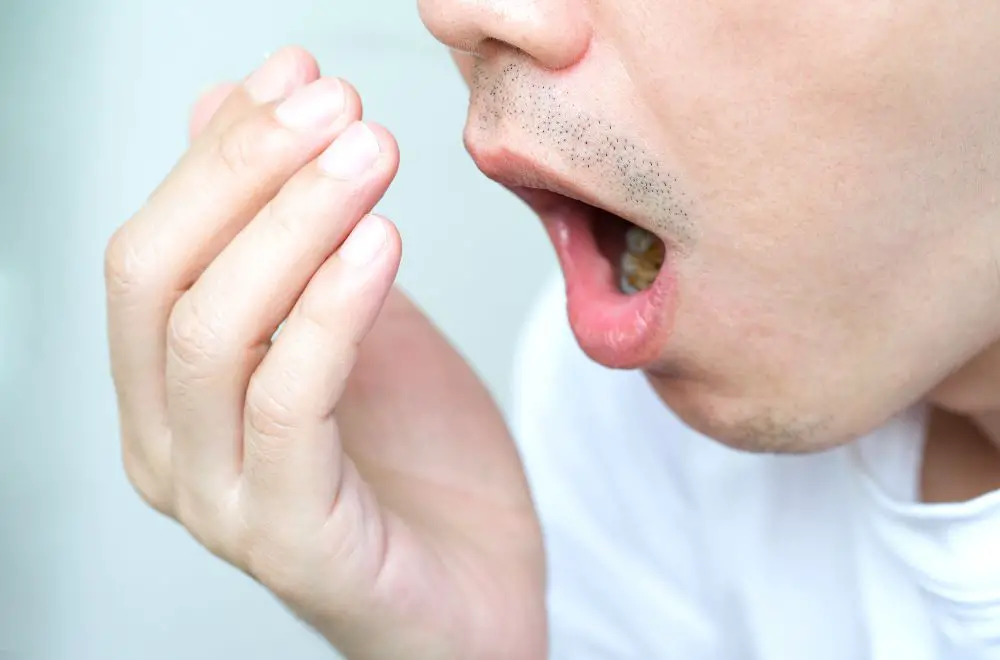
Definition of Halitosis
Halitosis, commonly known as bad breath, is an unpleasant odor that originates from the mouth. It can be an embarrassing and uncomfortable condition that affects many people at some point in their lives. Bad breath can be caused by a variety of factors, including poor oral hygiene, certain foods, and underlying health conditions.
Common Causes
There are several common causes of bad breath, including:
- Poor oral hygiene: When food particles and bacteria are left in the mouth, they can produce an unpleasant odor. Brushing and flossing regularly can help remove these particles and prevent bad breath.
- Certain foods: Foods such as garlic, onions, and spices can cause bad breath. These foods contain strong odors that can linger in the mouth even after brushing.
- Dry mouth: Saliva helps wash away food particles and bacteria in the mouth. When the mouth is dry, these particles can build up and cause bad breath.
- Smoking: Smoking can cause bad breath and other oral health problems. It can also increase the risk of gum disease, which can contribute to bad breath.
- Health conditions: Certain health conditions, such as sinus infections, respiratory infections, and diabetes, can cause bad breath. In some cases, bad breath may be a sign of a more serious underlying health condition.
Overall, bad breath can be a frustrating and embarrassing condition. Understanding the common causes of bad breath can help you take steps to prevent it and improve your oral health.
The Role of Oral Hygiene

Importance of Brushing
Brushing your teeth is essential to maintain good oral hygiene and prevent bad breath. When you brush your teeth, you remove food particles and plaque from your mouth, which can cause bad breath. Brushing also helps to stimulate the production of saliva, which is important for neutralizing the acids in your mouth that can cause bad breath.
It is recommended that you brush your teeth at least twice a day, for two minutes each time. When you brush your teeth, make sure to brush all surfaces of your teeth, including the front, back, and chewing surfaces. You should also brush your tongue, as bacteria can accumulate on the surface of your tongue and contribute to bad breath.
Limitations of Brushing
While brushing is important for maintaining good oral hygiene, it is not always enough to prevent bad breath. There are several factors that can contribute to bad breath, including gum disease, cavities, and dry mouth. In some cases, bad breath may be a sign of an underlying medical condition, such as sinusitis or gastroesophageal reflux disease (GERD).
If you are experiencing persistent bad breath, despite brushing your teeth regularly, it is important to see a dentist or doctor to determine the underlying cause. Your dentist or doctor can recommend additional treatments or lifestyle changes to help improve your oral hygiene and prevent bad breath.
Impact of Diet on Breath
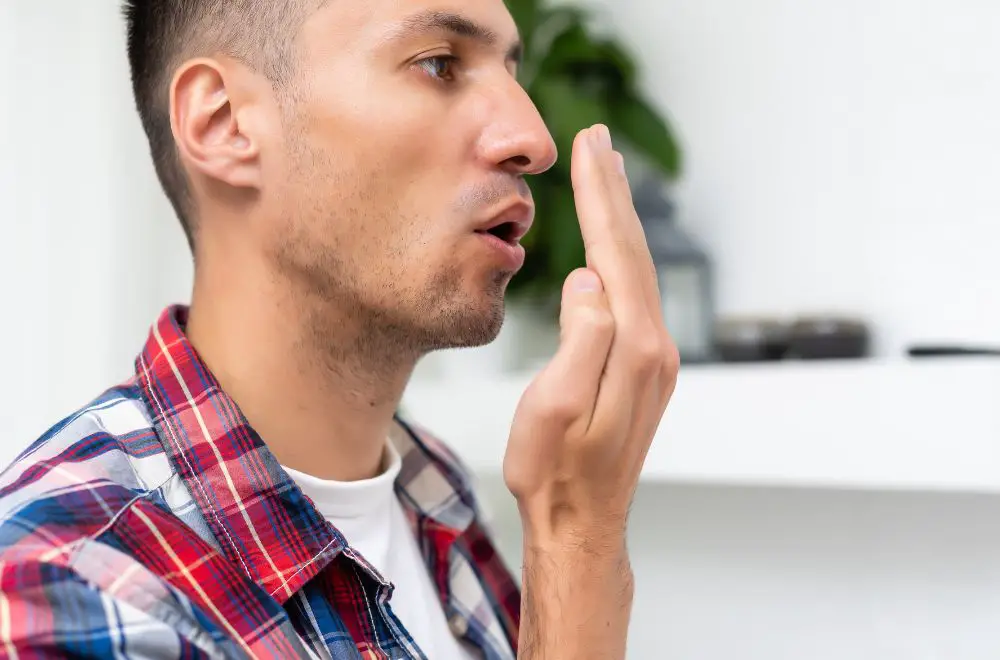
Diet plays a significant role in the smell of your breath. The foods you eat can either help freshen your breath or make it worse. In this section, we will discuss the impact of diet on breath.
Foods That Cause Bad Breath
Certain foods can cause bad breath, even after brushing your teeth. These include:
- Onions and garlic: These foods contain sulfur compounds that can linger in your mouth and cause bad breath.
- Spicy foods: Spicy foods can cause bad breath by increasing the production of saliva, which can lead to dry mouth and bad breath.
- Dairy products: Dairy products can cause bad breath by leaving a film on your tongue and teeth, which can harbor bacteria.
- Sugary foods and drinks: Sugary foods and drinks can cause bad breath by feeding the bacteria in your mouth, leading to an increase in odor-causing compounds.
To minimize the impact of these foods on your breath, try to brush your teeth or rinse your mouth with water after eating them. You can also try chewing on sugar-free gum or mints to freshen your breath.
Foods That Improve Breath
Some foods can help improve your breath. These include:
- Water: Drinking water can help flush out bacteria and food particles from your mouth, which can help freshen your breath.
- Crunchy fruits and vegetables: Crunchy fruits and vegetables like apples and carrots can help clean your teeth and stimulate the production of saliva, which can help freshen your breath.
- Green tea: Green tea contains polyphenols that can help reduce the growth of bacteria in your mouth, which can help freshen your breath.
- Yogurt: Yogurt contains probiotics that can help reduce the growth of bacteria in your mouth, which can help freshen your breath.
Incorporating these foods into your diet can help improve your breath. However, it is important to note that diet alone may not be enough to eliminate bad breath. It is still important to maintain good oral hygiene practices, such as brushing and flossing regularly, to keep your breath fresh.
Medical Conditions and Bad Breath

Bad breath can be a symptom of various medical conditions. Here are some of the most common ones:
Gastrointestinal Disorders
Gastroesophageal reflux disease (GERD) is a digestive disorder that can cause bad breath. This is because the stomach contents flow backward into the esophagus, and the regurgitated food can cause an unpleasant odor. Other gastrointestinal disorders that can cause bad breath include constipation, bowel obstruction, and liver disease.
Respiratory Infections
Respiratory infections can also cause bad breath. Sinus infections, bronchitis, and pneumonia are some of the most common respiratory infections that can cause bad breath. These infections can cause mucus buildup in the nose and throat, which can produce an unpleasant odor.
It is important to note that bad breath is not always a symptom of a medical condition. Poor oral hygiene, smoking, and certain foods can also cause bad breath. However, if you have persistent bad breath, it is important to see a healthcare provider to rule out any underlying medical conditions.
Professional Dental Treatments
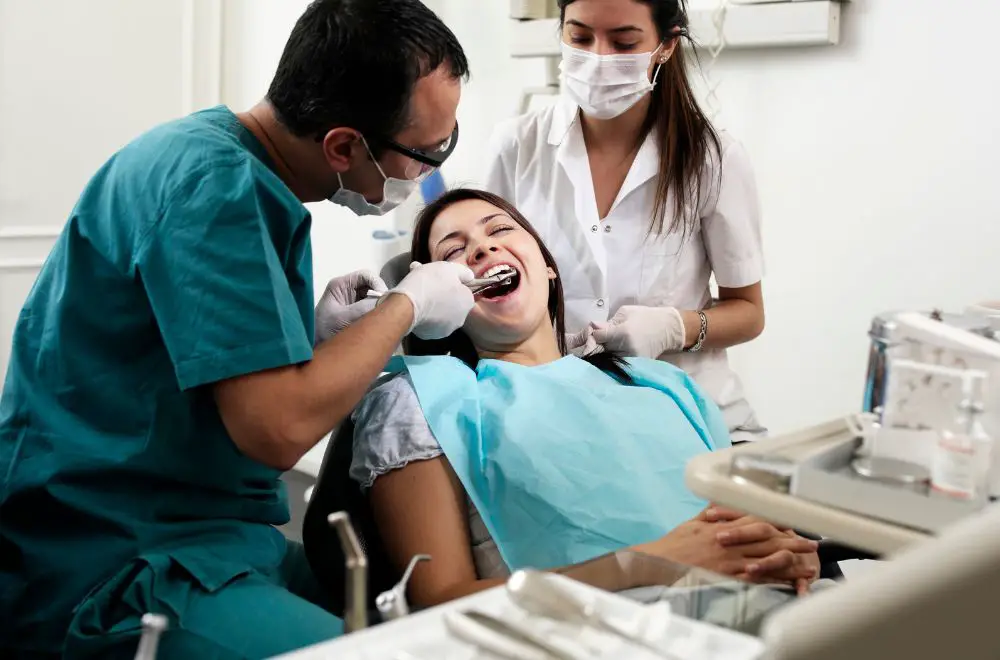
Regular dental check-ups and professional cleanings are essential to maintain good oral hygiene. Dentists can identify and treat any underlying issues that may be causing bad breath. During a dental check-up, the dentist will examine your teeth and gums for any signs of decay, gum disease, or other problems that could be contributing to bad breath.
Regular Dental Check-Ups
Regular dental check-ups are important to maintain good oral health. Dentists recommend that you visit them at least twice a year for routine check-ups and cleanings. During a check-up, the dentist will examine your teeth and gums for any signs of decay, gum disease, or other problems that could be contributing to bad breath. They may also recommend additional dental treatments to help improve your oral health.
Advanced Dental Procedures
Advanced dental procedures may be necessary to treat more severe cases of bad breath. These procedures may include deep cleaning, root canal therapy, or gum surgery. Deep cleaning involves removing plaque and tartar from below the gum line, while root canal therapy is used to treat infected or damaged teeth. Gum surgery may be necessary to treat advanced cases of gum disease.
In addition to regular dental check-ups and professional cleanings, maintaining good oral hygiene at home is also important. Brushing your teeth twice a day, flossing daily, and using mouthwash can help prevent bad breath. Avoiding foods and drinks that can cause bad breath, such as garlic and coffee, can also be helpful.
Overall, professional dental treatments can be effective in treating bad breath. Regular dental check-ups and cleanings, as well as advanced dental procedures, can help improve your oral health and prevent bad breath.
Frequently Asked Questions
How do I get rid of bad breath even after brushing?
Bad breath can be caused by a variety of factors, including poor dental hygiene, dry mouth, and certain health conditions. To get rid of bad breath, make sure you are brushing your teeth twice a day, flossing daily, and using mouthwash. You can also try drinking more water, chewing sugar-free gum, and avoiding foods that can cause bad breath, such as garlic and onions.
Why won’t my bad breath go away?
If your bad breath persists even after brushing and practicing good oral hygiene, it may be a sign of an underlying medical condition. Some possible causes of chronic bad breath include gum disease, sinus infections, and digestive issues. If you are concerned about persistent bad breath, it’s important to speak with your dentist or healthcare provider.
Why does my breath smell worse after mouthwash?
Mouthwash can help freshen your breath by killing bacteria in your mouth, but it can also mask the underlying cause of bad breath. If your breath smells worse after using mouthwash, it may be because the mouthwash is irritating your mouth or because it contains alcohol, which can dry out your mouth and make bad breath worse.
What causes bad breath from the stomach?
Bad breath can sometimes be caused by digestive issues, such as acid reflux or gastroesophageal reflux disease (GERD). These conditions can cause stomach acid to flow back up into the esophagus, leading to bad breath. If you suspect that your bad breath is caused by a digestive issue, it’s important to speak with your healthcare provider.
My husband has bad breath even after brushing.
If your husband has persistent bad breath, it may be a sign of an underlying health condition or poor dental hygiene. Encourage him to brush his teeth twice a day, floss daily, and use mouthwash. If his bad breath persists, he should speak with his dentist or healthcare provider.
Dry mouth bad breath.
Dry mouth can cause bad breath because it reduces the amount of saliva in your mouth, which can lead to the buildup of bacteria. To combat dry mouth, try drinking more water, chewing sugar-free gum, and avoiding alcohol and tobacco products. If your dry mouth persists, speak with your healthcare provider.


